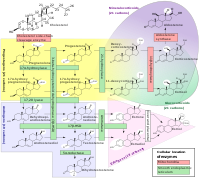11-Beta-Hydroxylase Deficiency

Congenital adrenal hyperplasia (CAH) due to 11-beta-hydroxylase deficiency is one of a group of disorders (collectively called congenital adrenal hyperplasia) that affect the adrenal glands. In this condition, the adrenal glands produce excess androgens (male sex hormones). This condition is caused by mutations in the CYP11B1 gene and is inherited in an autosomal recessive pattern. There are two types, the classic form and the non-classic form. Females with the classic form have ambiguous external genitalia with normal internal reproductive organs. Males and females with the classic form have early development of their secondary sexual characteristics (precocious puberty). The early growth spurt can prevent growth later in adolescence and lead to short stature in adulthood. About two-thirds of individuals with the classic form have high blood pressure which develops in the first year of life.
Females with the non-classic form of 11-beta-hydroxylase deficiency have normal female genitalia. As affected females get older, they may develop excessive body hair growth and irregular menstruation. Males with the non-classic form do not typically have any signs or symptoms except for short stature. High blood pressure is not a feature of the non-classic form.